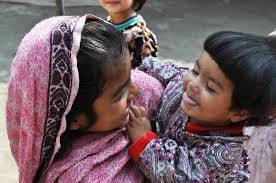Pic courtesy Chaidaani
Some time back I went to a restaurant to dine with friends. Next to our table sat a family with two of their kids and on another table sat a barely 12 year old domestic helper who was babysitting the third, who was a toddler. While the family enjoyed their food as a “happy family”, the girl looked on with sad eyes as she tried her best to pat the toddler to not cry, hoping that no one would notice her staring at the food on the table. I thought of this and wondered if this family was any better than our politicians.
This is a typical scene of our so called elite members of society and for me it is creating several abnormalities.
This is not a minor issue, if only we realize this. We keep complaining about the government’s incompetence, unprecedented levels of corruption and denying people the right to live. Are we not doing the same?
These kids working as domestic helps are no less than our own kids, only their circumstances are different. Just think of how we take care of our children when they go out in warm clothes during winters. How we try to create all possible conditions to make them comfortable in summers. How we go out of the way to educate them in the most expensive schools with the right “status symbol”. But when it comes to these kids who we hire to look after our children, we never really bother about them.
These kids already deprived of basic necessities of life and, without the many options and facilities that our kids have, are already at a disadvantage when they come to work for us. This is, of course, an issue for the government to ensure as part of the overall welfare state concept.
However, as long as this aspect of the welfare orientation does not get adequate attention these underprivileged children do not have any hope, and are doomed to eke out a living like all the other members of their family whose sole focus is to put bread on the table, and dream of milk and meat.
If you ask these children you will be surprised to find that each one of them once had a wish to go to school but was not able to do so owing to a lack of resources.
A friend of mine once sarcastically commented that these kids were neither interested nor ready to study, which is why the NGO community has pretty much failed in helping them in this.
I fail to understand how we expect these destitute children to go to school overnight when the conditions in their homes do not change and they have to work to help put food on the family table.
We can see this anomaly in our daily lives as well. We see a student in Home Economics College being taught to lay a table with full cutlery and crockery, but they do not do this at home if they come from a rich family. As a result they only memorize this for the exams and then forget it.
Another friend continually complains of how a help at her house is only interested in watching Indian movies and Turkish dramas and not to paying attention to her work.
How convenient to forget that these kids come from a background where they do not have much avenues of entertainment. For them these interludes of watching TV in between stints of doing their chores – and rounds of beating by the lady of the house for being slow at it – are pretty much the only interesting thing in their lives.
They cannot read books; they cannot go to the upscale, or for that matter, even the road side khoka, or out to picnic with their family – they only exist as minions for the rich.
I don’t understand what is wrong with mothers either. Why can’t they handle their children themselves instead of keeping these kids as help?
I was brought up abroad. I saw my mother doing everything a normal housewife does but never kept a babysitter for me or my sister. And these days, go to any party and we see mothers busy holding their clutch bags, shawls and top of the line cell phones, but they have no idea where the kids are.
And the poor domestic help turned baby minder for these outings, hardly able to handle her own clothes properly, still carries someone else’s burden just to be able to contribute to the feeding of her family.






